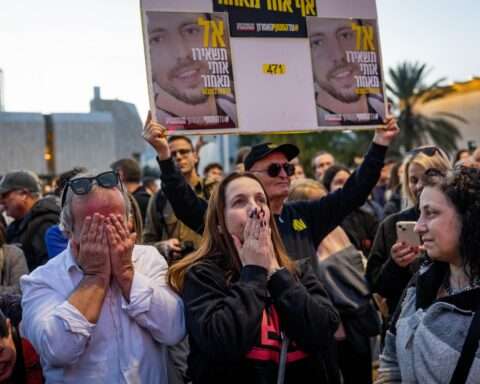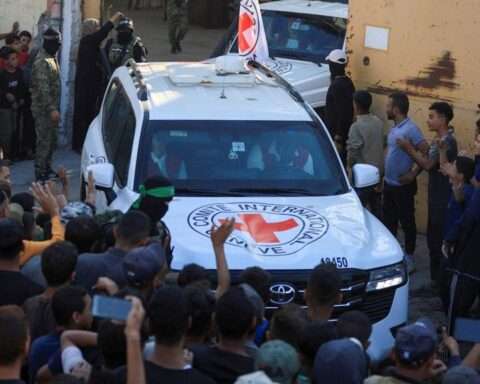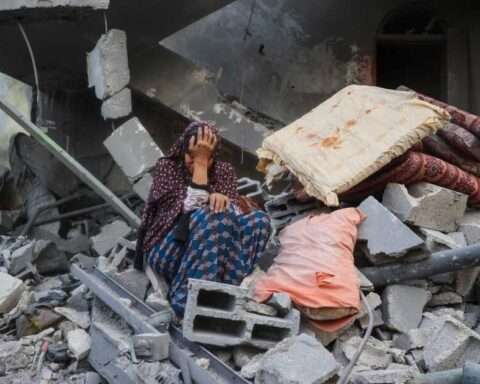Israel’s military said Monday that it was carrying out strikes in the southern Gaza city of Rafah, shortly after Hamas announced it had accepted a cease-fire proposal to halt its war with Israel.
Israeli Prime Minister Benjamin Netanyahu’s office said Monday that the cease-fire proposal was “far from Israel’s essential demands,” but that Israel would send negotiators to Cairo to continue talks for a cease-fire.
Meanwhile in Washington, the White House urged all sides to make a deal. Negotiators in Egypt have been trying to bring about a temporary halt in the fighting and the release of hostages still held by Hamas in Gaza.
“We want to get these hostages out,” said John Kirby, White House national security spokesperson. “We want to get a cease-fire in place for six weeks. We want to increase humanitarian assistance and the last thing that I want to do is say anything at this podium that’s going to put that process at risk. Regardless, as we’ve said before, we still believe that reaching an agreement is the absolute best outcome, not just for the hostages, but for the Palestinian people.”
Israel Defense Forces on Monday evening posted on the social media platform X that it was “currently conducting targeted strikes against Hamas terror targets in eastern Rafah.”
Netanyahu’s office said in a statement, “The war cabinet unanimously decided that Israel continue the operation in Rafah to exert military pressure on Hamas in order to advance the release of our hostages and the other goals of the war.”
On this, too, the White House expressed a strong stance, with President Joe Biden speaking to Netanyahu in a Monday morning phone call.
“It doesn’t matter whether it’s missiles or rockets; things that kill innocent people, that’s not okay,” Kirby said. “And again, the president made it clear that we don’t want to see operations in Rafah that put at risk those million and a half people that are there.”
A White House statement said Biden “reiterated his clear position on Rafah” during his call with the Israeli leader. It also said that Netanyahu agreed “to ensure the Kerem Shalom crossing is open for humanitarian assistance for those in need.”
Biden also hosted Jordan’s king at the White House, where they spoke about the situation in Gaza.
Earlier Monday, Israel said about 100,000 people in eastern parts of Rafah should evacuate their homes and go to an expanded humanitarian area that now includes Khan Younis.
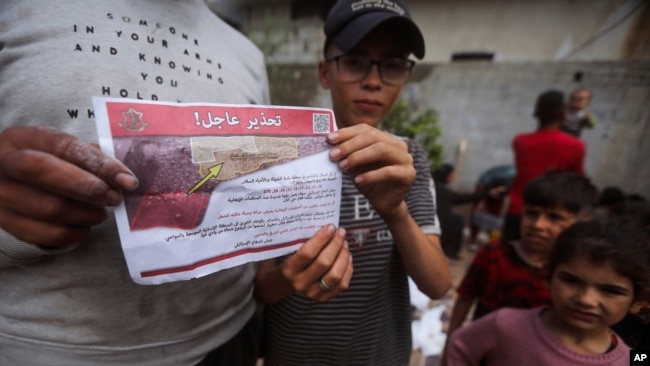
An Israel Defense Forces spokesperson, posting on social media in Arabic, said the Israeli military will act forcefully against terrorist organizations in Rafah, and that anyone who is in the area will be putting their lives at risk.
Israel is preparing a “limited scope operation” in Rafah, a military spokesperson said.
Israel has previously issued such warnings amid its campaign to eliminate the Hamas militant group in the Gaza Strip. Many of the Palestinians in Rafah traveled there seeking shelter after Israel warned them to flee other parts of Gaza.
Maps provided by the Israeli military previously showed a humanitarian zone along the Gaza coast west of Khan Younis. Monday’s announcement expanded that area both to the north along the coast, as well as east to include Khan Younis.
Israel has said an offensive in Rafah is necessary to defeat Hamas, while the United States, United Nations and others have warned of a potential humanitarian catastrophe if Israel carries out a large-scale attack in the area where more than half of Gaza’s population is sheltering.
President Joe Biden spoke by phone with Israeli Prime Minister Benjamin Netanyahu on Monday.
A White House statement said Biden “reiterated his clear position on Rafah.” It also said that Netanyahu agreed “to ensure the Kerem Shalom crossing is open for humanitarian assistance for those in need.”
In a statement Monday, U.N. Secretary-General Antonio Guterres said he was “deeply concerned by the indications that a large-scale military operation in Rafah may be imminent. We are already seeing movements of people — many of these are in desperate humanitarian condition and have been repeatedly displaced.”
He also called on both Israel and Hamas to “go the extra mile needed to make an agreement come true.”
World Health Organization Director-General Tedros Adhanom Ghebreyesus posted Monday on the social media platform X, “A full military incursion into Rafah will plunge the crisis into unprecedented levels of humanitarian need. A ceasefire is urgently needed for the sake of humanity.”
Reuters quoted a senior Hamas official calling the evacuation order for Rafah a “dangerous escalation that will have consequences.”
U.S. Defense Secretary Lloyd Austin highlighted the issue again in a Sunday phone call with Israel Defense Minister Yoav Gallant.
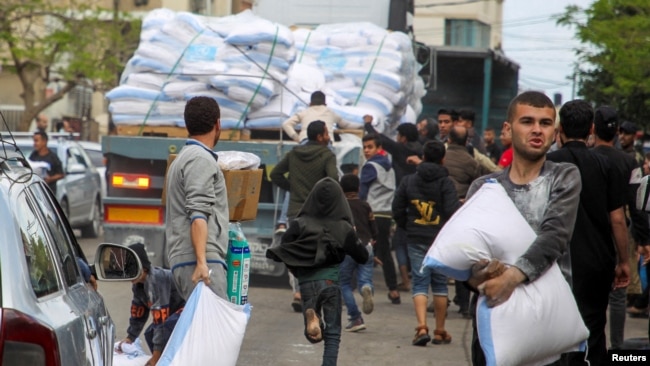
A Pentagon statement said Austin “reaffirmed his commitment to the unconditional return of all hostages and stressed the need for any potential Israeli military operation in Rafah to include a credible plan to evacuate Palestinian civilians and maintain the flow of humanitarian aid.”
Israel’s Defense Ministry said Gallant emphasized to Austin that military action was required in Rafah, and that there was no alternative.
The U.N. relief agency for Palestinians, UNRWA, said on social media Monday that an Israeli operation in Rafah would bring “more civilian suffering and deaths,” and “devastating” consequences for more than 1 million people sheltering there.
UNRWA said it would “maintain a presence in Rafah as long as possible and will continue providing lifesaving aid to people.”
The Israel-Hamas war was triggered by the October 7 Hamas attack on southern Israel that killed 1,200 people and led to the capture of about 250 hostages, according to Israeli officials. About 100 of the hostages were freed in a weeklong truce in late November.
Israel’s ensuing counteroffensive in Gaza has killed more than 34,600 Palestinians, about two-thirds of them women and children, according to the Gaza Health Ministry.
Cease-fire negotiations
Negotiators have been trying to find a breakthrough in cease-fire talks aimed at bringing a temporary halt in fighting and the release of hostages still held by Hamas in Gaza.
After no apparent progress was reported Sunday in talks with Qatari and Egyptian mediators, the Hamas delegation left Cairo to consult with its leadership and said it planned to return to Cairo on Tuesday.
Israeli officials did not send negotiators to Cairo to take part in indirect diplomacy.
After Hamas issued its statement Monday saying leader Ismail Haniyeh accepted a cease-fire proposal in a phone call with Qatar’s prime minister and Egypt’s intelligence minister, Israeli officials told media outlets that the plan approved by Hamas was not what Israel had agreed to.
The U.S. State Department and the White House said they were reviewing the Hamas response.
Kirby told reporters Monday that CIA Director Williams Burns was in the region having discussions on the Hamas response.
White House national security spokesperson John Kirby told reporters Monday that CIA Director Williams Burns was in the region having discussions on the Hamas response.
“We want to get these hostages out, we want to get a cease-fire in place for six weeks, we want to increase humanitarian assistance,” he said.
Haniyeh said Sunday that the group wants a comprehensive cease-fire that would end Israeli “aggression” and guarantee Israel’s withdrawal from Gaza, while Hamas frees about 100 hostages in exchange for hundreds of prisoners jailed by Israel.
Sunday in Jerusalem, Netanyahu rejected any end to the fighting that would leave Hamas in control of Gaza, the narrow territory along the Mediterranean Sea, and pose a continuing threat to the Jewish state.
The United States — which, like other Western powers and Israel, brands Hamas a terrorist group — has urged Hamas to enter a deal.
Some information for this story came from The Associated Press, Agence France-Presse and Reuters.



